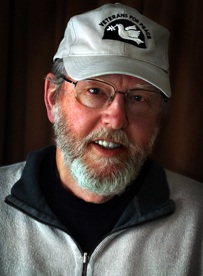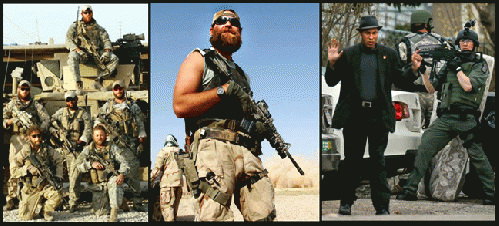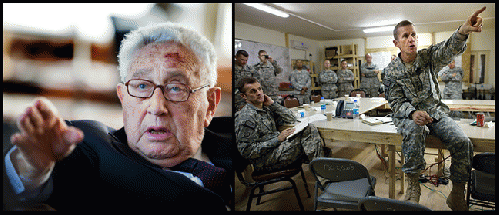- George Orwell
Everybody loves a good killer. American pop culture is saturated with the love of killers. The more sexy and elite the killer, the more reverence he or she receives and the more the obvious moral questions are parried away. As the Orwell quote, above, suggests, all societies revere "rough men" with the capacity to ruthlessly kill members of threatening nations or outlaw bands.
Nowadays, official killing demands the nurturing of an elite esprit-de-corps among the killers. Their work must be done in strict secrecy so we, the public, can remain ignorant and "safe in our beds" while the killer elite remain aloof and unaccountable. Furthermore, it's important to be able to easily marginalize those of us deemed by the killer elite and their promoters to be overly-delicate, moral scolds.
"Rough men" from Seal Team Six and a local police force. When do they become the problem?
This sense of embattled esprit-de-corps in conjunction with unaccountability is even seeping into our domestic police departments. In some cases, cops are too quick to shoot when things don't go right for them or they are dis'ed; in other cases, the connection to elite special-ops killers seems aspirational. Since 9/11 we've witnessed many linkages (like regional Fusion Centers and the distribution of surplus war weaponry) between the military and local police departments. In analytic stories focused on the "black lives matter" movement and policing, we're told our local police forces have moved from a Community Policing model to a Broken Windows model and now to something called an Intelligence-Based model. This sounds ominously close to the special-ops formula.
Like the frog in a pot of slowly heating water who doesn't realize he's being boiled to death, whether it's fear of attacks from outside or fear of violence and crime from inside, it seems time for the public to ask whether Orwell's "rough men" idea is applicable in today's confusing world or whether the sense of unaccountable, elite institutions focused on violence can become a threat in and of themselves.
Last Sunday, The New York Times ran a big front-page story that makes the case that lethal special-operations have become the military's "new way of war," what The Times calls a "global manhunting machine." Seal Team Six is the unquestioned top-of-the-line elite unit. Think Chris Kyle and the hagiographic film bio American Sniper. Seal Team Six is expanding with The Omega Program, which undertakes what The Times calls "deniable operations ... modeled after the Vietnam Phoenix Program." Then there's the team's global intelligence gathering force called The Black Squadron. Both have been given hip, pop-culture-friendly names. All this is part and parcel of the rise of the Pentagon as an unaccountable intelligence and covert operating force of its own parallel to the CIA.
These capacities, of course, work in conjunction with other "new ways of war" like highly sophisticated media intelligence gathering and lethal drones. All sorts of robotic weapons, space-to-earth weapons and cyber weapons are coming on-line every day. All of it secret as far as the American people go. The issues The Times piece raise are the grisly and cavalier killing of too many civilians on night raids, the physical and psychological effect all this has on the men (and women) doing the killing, how it angers local residents and the fact there is zero accountability. All investigations within Special Operations command are internal, and when a soldier is suspected of excessive and unnecessary killing on a mission, he's sent home for a rest. At home, of course, he's the ultimate hero with all the mitigating benefits that provides when his PTSD flares up at home.
In the introduction to his 2014 book World Order, Henry Kissinger points out that economic globalization threatens the sovereign nation-state era established at the end of the Thirty Years War in 1648 by the Treaty of Westphalia. With the rise of globalism in the realm of capitalism as well as in the realm of "terrorism," the old world order is breaking down. Kissinger is known for many things, among them his famous statement that "Power is the ultimate aphrodisiac." He's better known for the killing of millions of Indochinese long after Robert MacNamara secretly concluded in 1966 the Vietnam War was doomed to failure.
Kissinger concludes his book by assuring his readers of America's "humane and democratic values." Don't worry; we're the good guys. With no irony at all, he writes that "American military power provided a security shield for the rest of the world, whether its beneficiaries asked for it or not. ...[T]he developing countries were protected against a threat they sometimes did not recognize, even less admit." Think of those three million dead Indochinese; if only they knew it was all for their own good. We should not forget that Paul Bremer, George W. Bush's proconsul in Iraq who disbanded the Iraqi military and the Bath Party, was at the time an employee of Kissinger Associates. Bremer learned his strategic noblesse oblige from the master.
Henry Kissinger and General Stanley McChrystal
One of the important tactical masters of all this is General Stanley McChrystal, an enigmatic, ascetic general who rocketed up the ranks from one-star to four-star at the point the stumbling Bush administration realized it had whacked a huge hornet's nest in Iraq. McChrystal was instrumental in developing the lethal manhunting machine that kept the insurgency off-balance -- skills that are now becoming new war doctrine.
I had a brief exchange with General McChrystal at the Philadelphia Public Library a couple years ago when he was promoting his memoir. He told the audience that when he arrived to clean up the insurgency west of Baghdad he found rooms piled high with un-analyzed laptops and documents from night raids. A leader of incredible focus and intelligence, he whipped the system into shape so material from early-evening raids would be instantly analyzed by a bank of computer-nerdy intelligence specialists, leading to maybe a half-dozen more kill or capture raids throughout the night on unsuspecting leaders and go-to names found in the material.
Here's how journalist Michael Hastings described McChrystal's Iraq manhunting operation: "Figure out how your enemy operates, be faster and more ruthless than everybody else, then take the f*ckers out." Along with anyone who gets in the way. Hastings' profile of McChrystal in Rolling Stone ("The Runaway General") led to McChrystal's firing, thanks to some disrespectful things he'd said of his commander-in-chief, VP Biden and others. In June 2013, Hastings told friends he was going to be out of contact working on an important intelligence story when he ended up dead in a very mysterious, late-night auto crash in Los Angeles.
Mark Bowden, the author of Black Hawk Down and other paeans to our military prowess, shared the stage with McChrystal at the Philadelphia Library. Bowden fielded questions for the general. (Full disclosure: I've had a few cordial but argumentative e-mail bouts with the Philadelphia-based Bowden.) With a man like McChrystal -- a master at manhunting and public relations -- I figured it was best to load my question, since I concluded he would never give me a straight answer. Bowden saw my veteran's hat and pointed to me. So I asked the general a classic have-you-stopped-beating-your-wife question.
"I'm a Vietnam veteran and I've been a peace activist for the past 30 years. You were a one-star PR general in Baghdad who gave press briefings during the shock-and-awe invasion of Iraq. Then the insurgency began to grow in Baghdad and Anbar Province. You're obviously very brilliant and you quickly rose up the ranks to four-star general in charge of special ops. The so-called Surge involved a lot of very secret, focused killing, all under your command. My questions is: Do you ever have difficulty sleeping at night knowing you live in a democracy and the electorate of that democracy is kept in the dark as to what you are so good at?"
(Note: You can view every article as one long page if you sign up as an Advocate Member, or higher).






